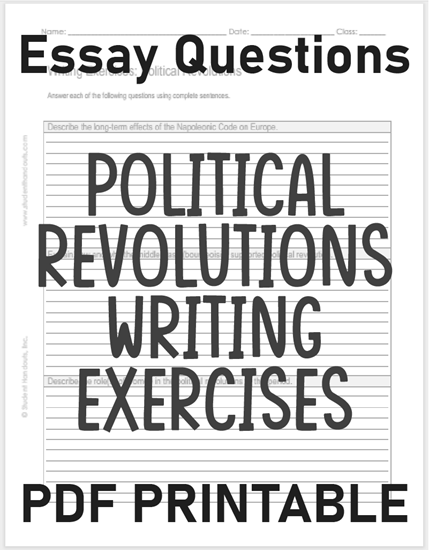| Political Revolutions Essay Questions |
|---|
| www.studenthandouts.com ↣ World History ↣ Napoleonic Era ↣ Napoleonic Era Worksheets |
 |
    |
|
Describe the long-term effects of the Napoleonic Code on Europe. The Napoleonic Code (1804) had profound long-term effects on Europe. It standardized laws, replacing feudal systems with principles of legal equality, property rights, and secular governance. Its influence spread across France's conquered territories and beyond, shaping legal systems in Germany, Italy, Spain, and Latin America. By promoting meritocracy over hereditary privilege, it weakened aristocratic power and laid foundations for modern civil law. Despite its conservative gender and labor provisions, its emphasis on clear, accessible law endured as a lasting legacy. Explain how and why the middle class (bourgeoisie) supported political revolution. The bourgeoisie (middle class) supported political revolutions—such as the French Revolution (1789) and 1848 Revolutions—to dismantle feudal privileges and absolutist monarchies that restricted their economic and social advancement. As merchants, professionals, and industrialists grew wealthy, they demanded political representation, legal equality, and free-market reforms. Their financial resources and intellectual leadership (e.g., Enlightenment ideals) made them key drivers of revolutionary movements, seeking to replace aristocratic dominance with liberal, constitutional governments favoring their interests. Describe the role(s) of women in the political revolutions of this period. During the Napoleonic era, women played active but often overlooked roles in political revolutions. Some, like Théroigne de Méricourt and Charlotte Corday, participated directly in the French Revolution, while others hosted salons that spread revolutionary ideas. However, Napoleon's Civil Code (1804) reinforced patriarchal control, restricting women's rights. Despite this, working-class women protested food shortages, and a few, like Germaine de Staël, influenced politics through writing. Their contributions were marginalized but laid early groundwork for future feminist movements. Click here to print. Answers will vary. |
| Napoleonic Era Books and Films | Napoleonic Era Outlines and PowerPoints |
| Napoleonic Era Maps and Pictures | Napoleonic Era Study Games |
| Napoleonic Era Miscellany | Napoleonic Era Worksheets |
| www.studenthandouts.com ↣ World History ↣ Napoleonic Era ↣ Napoleonic Era Worksheets |














































